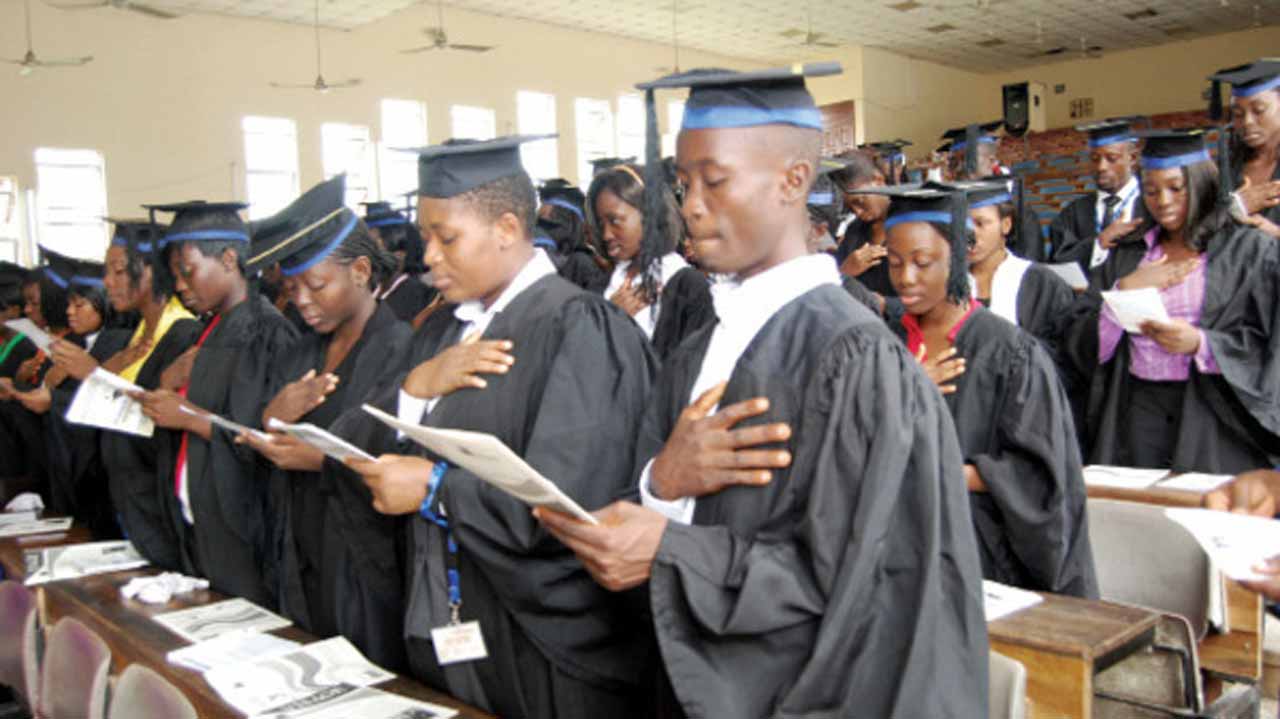Education
Does JAMB Decide Cut-off Mark?

By Fabian Benjamin
There is nothing like a uniform minimum national Unified Tertiary Matriculation Examination (UTME) score for any of the tiers of tertiary institutions and neither does the Joint Admissions and Matriculation Board decide any such requirement for any institution.
The Board does not and has never determined any uniform national UTME scores otherwise known as cut-off mark by the general public for any tertiary institution because, in actual sense, there are no uniform national UTME scores.
The lucid process of admission which the former President of the Academic Staff Union of University, Prof. Nasir Fagge, expounded and which was published in Premium Times is the exact process being followed in the conduct of admission exercise to tertiary institutions in the country.
This process has even been improved upon with the elimination of human interefence through its full automation with the introduction of the Central Admissions Processing system(CAPS).For the purpose of emphasis, the Board conducts the UTME and hands over the results to institutions for the conduct of admissions. However, before the admission exercise commences a policy meeting is held with all the Heads of the Institutions in attendance and chaired by the Hon. Minister of Education. At this meeting, the admission guidelines, which include recommendations from individual institutions and their preferred minimum admission scores, are presented and deliberated upon at the meeting and not JAMB as erroneously portrayed by Prof. Fagge, because JAMB is only a member out of the close to about a thousand participants at the meeting.
Prior to the meeting, for instance, more than 50% of the universities had submitted in writing their minimum scores of 200 and above to the Board for presentation to the meeting for the purpose of deliberation. The same applied for the other tiers of tertiary institutions. The implication of this process is that no institution would be able to admit any candidate with any score below what they had submitted as their minimum score.
Perhaps, it is also apt to address the series of misconceptions as to what is generally described as “uniform minimum national UTME score” for admission into tertiary institutions in Nigeria entails. For some time now, many candidates and some members of the general public have been under the erroneous impression that there is a minimum national UTME score set by the Board, which they also refer to as “cut-off point”. The truth is that there is nothing like a national minimum UTME score for all Universities, Polytechnics or Colleges of Education in Nigeria as it is only individual institutions which set their minimum entry scores based on their peculiarities.
The Board has no role whatsoever in the decision of the institutions to determine how or with what criteria they want to admit. The role of the Board is to ensure that the goalpost is not shifted in the middle of the game. Furthermore, in most cases, the UTME score is not the sole determinant of placement of candidates into tertiary institutions. As such, the undue attention to the so-called national minimum UTME score (UTME cut-off point) is a major conception of many ill-informed candidates who assumed that they have finally attained the benchmark having achieved the so-called minimum national score or “cut-off point’ for admission.
It is, therefore, a double jeopardy for many candidates who subscribed to the popular myth of a uniform UTME score (cut-off) for all Universities, Polytechnics or Colleges of Education in Nigeria.
The myth also incorporates the erroneous impression that it is only the UTME score that constitutes the benchmark for admission. This is far from the truth. Hence, such candidates on attainment of particular grades in the UTME celebrate in advance of their imminent placement in their institutions of choice, which in reality may not come to pass at the end of the day.
The Board, therefore, for the umpteenth time, is stating unequivocally that there is
no uniform minimum UTME score (cut-off) for all Universities, Polytechnics or Colleges of Education in Nigeria because each institution determines and submits to JAMB its minimum UTME score after analysing the UTME scores of its applicants against its available quota. It should, therefore, be noted that decisions at the annual Policy Meeting on Admission does not reduce this minimum prescriptions emanating from the institutions except in the few situations where these institutions had submitted minimum UTME scores that fall below what the Policy Meeting considers as the acceptable minimum score. That is where the much-talked about 140 came from, which is but a baseline that no institution should cross.
It should, therefore, be noted that UTME score is just one of the two or three scores that are generally cumulated to obtain the eventual aggregate score and ranking of the candidates by most institutions. Other parameters are Post-UTME/Post-A/L qualifications screening test score; O/L grade score; and in some cases, physical test (such as applicable in the Nigerian Defence Academy/Police Academy).Therefore, it is the score from all these segments that are added together to have an eventual ranking table or “cut-off” score.
Prof. Fagge and his likes may wish to request the video clips of the proceedings of the just-concluded 2022 Policy Meeting on Admissions to see how institutions are practically in charge of their various submissions on who they want to admit.
Dr Fabian Benjamin is Head, Public Affairs and Protocol JAMB
Education
Bells Varsity Honours 91 Students with First Class at 16th Convocation

Bells University of Technology, Ota, Ogun, on Saturday awarded 91 students of the institution First Class (Honours) at its 16th Convocation Ceremonies.
The convocation ceremonies are for the 2023/2024 academic session.
Ojediran said that a total of 969 students graduated in the academic session.
He said that they comprised the 91 students who made First Class grade, 505 who secured Second Class (Upper Division), 313 with Second Class (Lower Division) and 60 graduating with Third Class.
The vice-chancellor said that 220 students were graduating in the post-graduate category.
Mr Sally Farouk from the university’s Department of Architecture emerged the overall best student with a Cumulative Grade Point Average of 4.
94, according to Ojediran.He said that the institution set out to proffer best solutions from collective knowledge, shared experiences and resources, recognising that education was a lifelong activity.
The vice-chancellor lauded the staff of the university for cooperation and dedication to giving the students quality education.
“You have joined hands with the management of the institution to work on this fertile ground,” he said.
The Pro-Chancellor of the institution, Prof. Bart Nnaji, said that university was the first private university of technology in Nigeria, noting that it was established in 2005.
Nnaji said that the institution had made remarkable achievements in teaching and research as part of its vision to contribute to the growth and development of Nigeria.
“Let me also congratulate the graduating students who have distinguished themselves through their hard work and discipline and are being rewarded today.” he said.
In his remarks, the Chancellor of the institution, Dr Ibrahim Dankwambo, commended former President Olusegun Obasanjo for contributions to education development in the country.
Dankwambo also congratulated a former Executive Secretary of National Universities Commission (NUC), Prof. Peter Okebukola, and the Executive Director of Sahara Group, Mr Temitope Shonubi, for honorary doctoral degree given them by the university.
Report says that Okebukola and Shonubi were conferred with the degree for their outstanding pedigrees and services to humanity. (NAN)
Education
Prioritise Teachers’ Welfare, NUT President Urges Governors

President of Nigeria Union of Teachers (NUT), Audu Amba, on Tuesday, called on state governors to prioritise the welfare of teachers to enhance quality education at the grassroots.Amba made the call at the Adamawa NUT Delegates’ Conference, with the theme: “Education Challenge in an Economy of Uncertainty: Effect of Teachers,” in Yola.
While appreciating Gov. Ahmadu Fintiri for the immediate implementation of N70,000 minimum wage, he called on other governor, who had yet to implement it in their states to do so. The NUT president advised members to be productive and strive to undergo training and retraining to further enhance their efficiency and effectiveness.He called on delegates to elect leaders who would lead well and be bold enough to protect the interests of teachers.Amba also appealed to the governor to implement the minimum wage for primary school teachers and local government workers.In his address, Chairman of Nigeria Labour Congress (NLC), Adamawa chapter, Emmanuel Fashe, decried what he called over-taxation of the civil servants in the state, following the implementation of the new minimum wage.Fashe commended the state government for the recent employment of qualified teachers, calling for employment of more, especially primary school teachers.He urged the delegates to conduct themselves in an orderly manner and vote wisely.The governor, represented by his Special Adviser on Education Reform, Prof. Sofema Geoffrey, reiterated his administration’s commitment to the development of education in the state.According to him, NUT has a lot to showcase in term of support to government to ensuring quality education in the state.Fintri urged the delegates to conduct a peaceful conference.He assured that other issues at the forum, especially the ones on over-taxation, would be put into consideration. (NAN)Education
Over 40 Students Bag First Class at FUL

From Joseph Amedu, Lokoja
No fewer than 41 Students out of the total number of 1,863 bagged first class degree at the 8th convocation ceremony of the Federal University, Lokoja
The Vice Chancellor of the University, Professor Olayemi Akinwumi, disclosed this in his speech at the 8th convocation ceremony held at the Felele main Campus of the institution in Lokoja at the weekend.
He said that 461 students were conferred with Second Class Upper and 974 got Second Class Lower while 384 students bagged Third Class and 3 students were awarded Pass Degree.
Professor Olayemi Akinwumi also announced that a total of 117 students were awarded Diploma and 216 with postgraduate degrees: Ph.
D, Master’s and PGD.He said that within his short period in office, the university had embarked on a landmark Collaboration with Rural Electrification Agency to provide reliable power generation via renewal energy solutions such as installation of campus-wide street lighting and establishment of renewable energy training centres.
The Vice Chancellor also announced that Federal University, Lokoja under his administration established the first-ever Zoo and Conservatory in Kogi state to serve not only as a significant hub for research and education but also provide a unique platform for community engagement and environmental conservation.
“It is worth noting that prior to my assumption of office in 2021, only two inaugural lectures were held at our university but now I am proud to share that we have successfully conducted a total of twenty-two inaugural lectures since then.
“In our commitment to fostering engagement with critical societal issues, we have prioritised public lectures as the cornerstone of our mission at FUL. Since our last convocation, we have successfully organized six impactful public lectures that have addressed a variety of important topics” Professor Olayemi Akinwumi further disclosed.






















